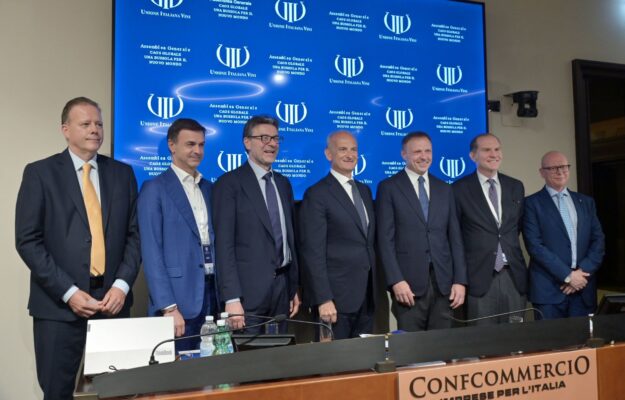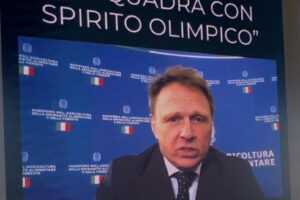“The difficulties are there, but wine is not in crisis. We are not asking for welfarism, but for recognition of the value of our sector, which creates wealth and GDP, in Italy as in Europe, where wine employs 3 million people and generates 130 billion euros of gross domestic product, 1.1% of the European total. We ask the Italian government to be strong in the EU, in a new Europe from which we expect more unity of purpose between Parliament and the European Commission, for an EU that has a world leadership role, and counts at least as much as the U.S. and Brics. We ask to invest in a CMO that helps to develop the market, after we reached an export of 7.8 billion euros in 2023, as Italian wine, but with 62% of the total concentrated in 5 markets, a plateau that needs to be expanded. We need more speed in some responses, we ask for strategic and clear choices, such as on the overused issue of sustainability, which is very important, but to which we must give substance”. This is the course to be charted for the future of Italian wine, according to Lamberto Frescobaldi, president of Unione Italiana Vini - Uiv, today in an assembly in Rome, in the presence, among others, of the Ministers of Agriculture, Francesco Lollobrigida and of Economy, Giancarlo Giorgetti, as well as the top management of Veronafiere-Vinitaly, with president Federico Bricolo, and Ice, with president Matteo Zoppas, and Confagricoltura, with Massimiliano Giansanti, and Coldiretti, with Ettore Prandini.
A difficult course to chart, in a world that has changed, and that today is experiencing a sort of new “year zero”, after experiencing a pandemic and while there are so many wars going on, on the borders of a West that thought it had overcome forever issues that, instead, cyclically come back and will come back, and that need to be addressed, and with a new world balance all to be deciphered, but that no longer has the U.S. (first wine market, ed.) as a pivot, as explained in the round table “Global Chaos. A Compass for the New World”, the contributions of Andrea Cangini, secretary general of the Luigi Einaudi Foundation; Teresa Coratella, deputy head of the Rome office of the European Council of Foreign Relations; Andrea Margelletti, president of the Center for International Studies (Cesi) and adviser to the Minister of Defense; and Riccardo Puglisi, professor of Finance Science at the University of Pavia.
A picture that casts great uncertainty, which, as mentioned several times, is the main enemy of those who have to do business, plan investments and strategies. Without getting carried away on some aspects, such as the issue of vineyard explantations that is already in reality in France, explicitly talked about in Spain, and that someone is venting in Italy. “We are clearly against it, especially if we are talking about vineyards on hillsides or high ground. In addition, many vineyards were also planted thanks to taxpayers’ money through the Wine CMO, and I say that as an entrepreneur I would be ashamed, now, to go and ask for more public money to uproot them”, Frescobaldi said. A position shared, on this particular aspect, by the Minister of Agriculture Francesco Lollobrigida, who also opens to a path, that will finally lead to the definition of the issue of the production of “alcohol-free wine” also in Italy, as repeatedly requested by the supply chain, Unione Italiana Vini in the lead: “We will define the rules on alcohol-free wine”, said Lollobrigida, “beyond my positions. I say, let’s sit at a table and reason pragmatically. We need to be attentive to the image we want to give, of wine, in new markets, and with which products we enter them. I think of India, for example. Or China, where 50 million people have joined the middle class that can buy our products. If we arrive there with alcohol-free wine, the new consumers will understand that wine is that way, and the risk is to damage the rest of the production. And as Italy, we have to play the quality challenge on alcohol-free wine as well, which is not easy even according to many who are in favor of producing it. But in any case, we will figure out how to proceed because, certainly, we don’t want is to curb the growth of businesses”.
Businesses and institutions that must work together, Frescobaldi and Lollobrigida said, even in the battle to defend the sector from the attacks that come in the name of healthism, working on the cultural aspect, the UIV president reiterated. And emphasizing, for wine, but not only, the whole value of agriculture, said the Minister of Agriculture, “which is not just production and that’s all. What we are doing, as a government, to support the sector, is not the granting of privileges for agricultural enterprises, but a concept of induced subsidiarity because enterprises, from wine enterprises that chisel the territories and also create beauty, to all the others, with their work maintain the territory at lower costs than those that the state should support”.
Another issue on which businesses and institutions need to work together is the fight against illegal recruitment: “what is happening is not acceptable, even more so in the wine sector. It is not right, nor is the fact that a few rotten apples damage the whole sector”, said Frescobaldi, with particular reference to the cases of illegal recruitment and exploitation that have emerged in recent hours in the Langhe. But wine, as mentioned again by Frescobaldi, and then emphasized by Finance Minister Giancarlo Giorgetti, has the strength to look to the future. “Today, also thanks to the stability of the government, and to many reforms, there is an Italian system that is ideal for investment and production, even compared to other European countries, and that can attract investment. Everyone must do their part, state, and businesses all. Wine has worked well: in 20 years there has been a great growth, and this is how it must continue”. “Legs on our shoulders, optimism that is fundamental for those who are entrepreneurs, and let’s get back to beating the markets and taking our wine to the world”, Frescobaldi concluded.
Copyright © 2000/2026
Contatti: info@winenews.it
Seguici anche su Twitter: @WineNewsIt
Seguici anche su Facebook: @winenewsit
Questo articolo è tratto dall'archivio di WineNews - Tutti i diritti riservati - Copyright © 2000/2026







































































































































































































